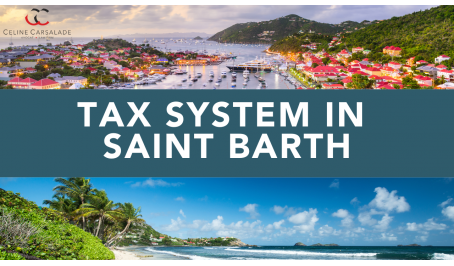A Look Into Saint Barth's Tax System
This #MemberInsights article is authored by Céline Carsalade Law Firm Office.
Each country’s tax code is a multifaceted system with many moving parts, and the beautiful paradise Caribbean island in the French west indies is no exception. The first step towards understanding Saint Barthélemy's tax code is knowing the basics...
Key date
2007 → Adoption of organic law n°2007-223 of 2007, February 21st laying down the statutory and institutional provisions regarding French overseas territories Saint-Barthelemy Island emancipates from Guadeloupe department and becomes an Overseas Collectivity. Fiscal sovereignty of Saint-Barthelemy Island.
2008 → Coming into force of the Contributions Code of Saint Barthelemy
Tax and real estate investment in Saint Barth
Facilitate the Real Estate Investment in Saint-Barth via the tax system. In general, investors are attracted by a merciful and optimum fiscal regime.
➔ As such, the Overseas Collectivity of Saint-Barthelemy wishes to develop real estate investment on the island and then, equip itself with an advantageous tax system than the mainland’s one. Tax and real estate investment in Saint Barth.
➔ Their goal? Favor the tax system while avoiding:
- The creation of a fiscal paradise
- The setting up of double taxation (precisely with mainland France and the USA)
Drafting by the OC of Saint Barth of a contributions Code in this way, with regards the powers attributed by the organic law.
What is it to be a fiscal resident of Saint-Barth?
The concept is defined by articles 2 to 5 of the Contributions Code
These provisions distinguish:
- Fiscal residency of natural persons
-
Fiscal residency of legal entities
-
Acquisition of fiscal residency
-
Effects of fiscal residency
Fiscal residency of a natural person
Acquisition of fiscal residency by natural persons: Article 2 of the Contributions Code
To summarize, fiscal residents of Saint-Barthelemy are natural persons who:
-
Have been living on the island for more than 5 years OR
-
Are practicing a professional activity for more than 5 years on the Island OR
Have the center of their economic, materialistic, and moral interests on the Island
The effects of fiscal residency of a natural person
Article 3 of the Contributions Code
To summarize, the effects of fiscal residency of Saint-Barthelemy are restricted to the incomes acquired on the Islands. The incomes from Mainland France or abroad follow the tax system of their place of origin.
Consequently: All individuals having an activity in Mainland France, even if they are fiscal residents of Saint-Barthelemy, shall declare in Mainland France the incomes being the result of such activity.
Fiscal residency of legal entity
The acquisition of fiscal residency by legal entities
Article 4 of the Contributions Code
To summarize, legal entities having their fiscal residency in Saint-Barthelemy are those:
-
Having their effective center of management on the island for more than 5 years OR
- Controlled directly or indirectly by a fiscal resident of the Island
In practice, investors create a company in Saint-Barth and Acquire fiscal residency after a 5 year period. During the first 5 years’ period, they are taxed by the Tax Center of BasseTerre and are beneficiary of a 30% allowance on taxes
The effects of fiscal residency of legal entity
Article 5 of the Contributions Code
To summarize, just as natural persons, legal entities, even if they are fiscal residents of Saint Barthelemy, are taxable on incomes from their activities in Mainland France or abroad.
Example of a Real Estate Company (Société Civile Immobilière) collecting rental incomes from a property located in Mainland France or abroad: these incomes are taxable in Mainland France or abroad and need to be declared before the competent authorities.
Beware of possible double taxation: real estate capital gain!


